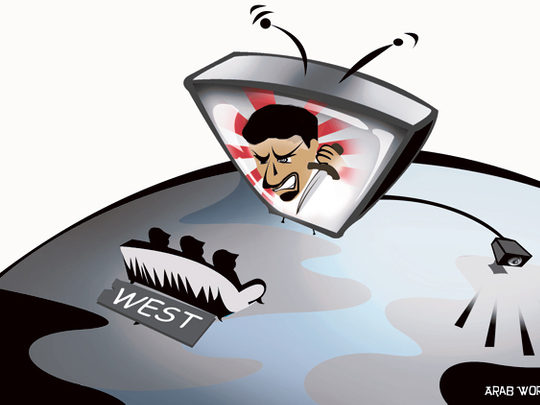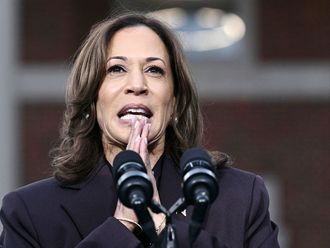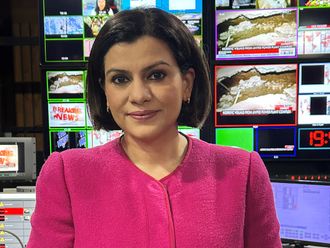
I can vividly recall when Michael J. Fox's notorious movie Back to the Future was first released in the mid 80s in which Libyans stormed through the movie screen in their Volkswagens, firing at the main characters with their machine guns, and shouting blurred phrases in Arabic.
As we are all well aware, these sorts of Hollywood scenarios have for long played on Western movie screens, not only targeting Libyans, but Arab-Muslim people as a whole. More disturbingly, those recurring images have become crystallised into widely accepted stereotypes amongst people living in the West whose only source of information has been a biased media delivering news that happens to serves its political and imperialistic motives.
However, the recent revolutionary storms in the Arab region are not only managing to sweep away some of the old frames of Middle Eastern and African regimes, but are also tearing down stereotypes and stripping off many false conceptions that have for long existed in the western mindset.
Empathy
Recently, I attended a lecture by professor Mustafa Bayoumi at the Abu Dhabi Book Fair. An Arab-American teaching at a college in Brooklyn, New York, Bayoumi emphasised the importance of bringing the West to "not only sympathise, but also empathise" with the average Arab person — where empathising is more than merely feeling sorry for Arabs but also identifying with and vicariously experiencing their struggle as humans.
As a result of the recent events, the prevalent negative narrative on Arab/Muslims has been disrupted. Throughout the past few months, the West has come to see that the majority of Arab-Muslims happen to be victims living under the rule of mad tyrants and dictatorial regimes.
As people march on Arab streets asking for freedom, dignity, and liberation, a Westerner is better able to draw a distinction between the corrupt politicians and the victimised population.
The Arab world is no longer perceived as ‘the source of evil', as has especially been the case for the past decade under the previous George W. Bush administration. It has become apparent to the West that within each Arab country exists a population of courageous Arab people who could no longer bear the weight of the oppressive regimes under which they live.
I asked professor Joshua Landis, Director of the Centre for Middle East Studies at the University of Oklahoma, if he thought the recent uprisings have changed Western views of Arabs for the better.
He replied, "The uprisings gave westerners and Arabs alike a view of Arabs as united, liberal, and freedom loving — all characteristics that are admirable and respected. After years of watching civil wars in Lebanon, Iraq and Palestine as well as living through the troubles of jihadism and Islamic unrest, westerners, like Middle Easterners themselves, had begun to view Arabs in terms of chaos, anger and destruction rather than order, happiness and creativity, or the fairer qualities of humanity."
From a Canadian perspective, Jennifer Osmar, Constituency Assistant to the Member of the Legislative Assembly of British Columbia said: "I believe that coverage of the events in the Middle East is having a unifying effect here. Although we don't share a direct experience with Arabs, we see fathers, mothers, grandparents, children — people who want the best possible life ... yet they must fight for it, die for it, appeal for it. We take our freedoms for granted and think we can judge people who live outside of this reality, the only one we have ever known."
Unbiased media
Most definitely, the change in awareness of the people in the West is directly related to the availability of an unbiased media reporting footage of actual events as they happen on Arab streets.
This has allowed the West to become better connected with the Arab world, not only in images but also in emotions as they have been able to hear real stories about the struggles, the passions, and the dreams of the Arab people.
Lydia Wright, a British citizen living in Canada, said: "With the latest events we have come to see a new representation of the life of an average Arab enduring an unbearable state of oppression.
"The lack of human rights and social freedoms has now come to light and has shocked many of us in the West!"
Political walls of division and injustice are being knocked down, and the world is witnessing a painful labour of a new era in the Arab world. Many hopes are attached to the birth of the new Arab regimes; however, unless the new governments are true democracies worthy of the respect of humanity, all of our dreams may go down the drain.
In other words, unless the new regimes are constructed by true and sincere individuals free of any form of extremism and radicalism, we are bound to face worse time as Arabs, and when it comes to the eyes of Western media, our image will remain disfigured for generations to come.
Ghada Al Atrash holds a Master's degree in English and teaches at a college in Abu Dhabi.











